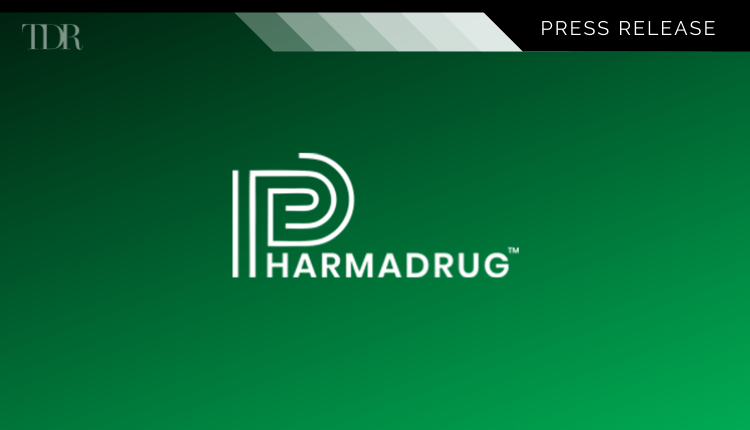
PharmaDrug Files For FDA Orphan Drug Designation For DMT In Kidney Transplantation and Expands on Its Psychedelics Strategy
PharmaDrug Inc (CSNX: BUZZ) (OTCMKTS: LMLLF), a specialty pharmaceutical company focused on the research, development and commercialization of controlled-substances and natural medicines such as psychedelics, cannabis and naturally-derived approved drugs, is pleased to announce it has expanded its psychedelic pharmaceutical program with the filing of an application with the US Food and Drug Administration (“FDA”) to receive Orphan Drug Designation (“ODD”) for N,N-Dimethyltryptamine (“DMT”) in the prevention of ischemia reperfusion injury in patients undergoing kidney transplantation.
Pharmaceutical Psychedelics Strategy
Following the acquisition of Sairiyo Therapeutics and its biotech R&D core competencies, PharmaDrug has undertaken efforts to expand its research activities in the pharmaceutical psychedelics space. The Company’s psychedelic pharmaceutical strategy will focus specifically on DMT. Through engagement with respected academics and medical/clinical KOLs in the space, management will initiate pivotal preclinical and clinical development activities. Taking advantage of existing expertise and relationships, PharmaDrug will seek to broaden its intellectual property portfolio by creating unique DMT formulations. Further differentiation in the space will be derived from the work that PharmaDrug will initiate around novel uses for DMT; the ultimate goal of which is to fuse outstanding science and clinical translation.
Our orphan drug designation application for DMT in the prevention of kidney injury during transplant surgery fits with our psychedelic pharmaceutical strategy of creating a unique portfolio of DMT therapies targeting rare disorders while also focusing on foundational research with DMT to explore and evaluate its therapeutic potential both in the brain and other human organs.
Daniel Cohen, CEO of PharmaDrug
Daniel Cohen continued: “We have been focused on laying the foundation in becoming an industry leader in the research and development of novel uses for DMT in the treatment of neuropsychiatric, neurological and inflammatory disorders. Although DMT is commonly associated with offering an intense psychedelic experience, the therapeutic potential of DMT is fascinating and remains underexplored. We aim to unlock the potential of DMT in treating unmet medical needs beyond its potential utility in mental health disorders.”
Kidney Transplants and DMT
The population of patients needing renal replacement therapy worldwide is estimated to be 5 million. There is a significant worldwide shortage of suitable kidney donors for transplantation. The number of kidney transplantations performed worldwide in 2018 was 75.664 [1].
In the U.S., the Human Resources and Services Administration and the Department of Health and Human Services Organ Procurement and Transplantation Network estimated that there are approximately 109,000 individuals currently on the national transplant waiting list and approximately 92,000 of these are waiting for a kidney transplant. In 2020, the number of patients receiving a kidney transplant was 22,871 down 2.5% from 2019 when there were 23,401 kidney transplants.
Ischemia/reperfusion injury (IRI) is caused by a sudden temporary impairment of the blood flow to a particular organ. IRI is associated with a robust inflammatory and oxidative stress response to hypoxia and reperfusion which disturbs the organ function. Quickly restoring blood supply of ischemic kidney remains the cornerstone for avoiding or reducing injury from ischemia. Additional strategies used to attenuate the damage induced by reperfusion include ischemic preconditioning, ischemic postconditioning, and machine perfusion. These strategies are expensive, sometimes difficult to perform in clinical settings, and provide only limited benefit. As such, novel approaches that prevent transplant associated renal IRI are sorely needed.
Research studies have shown that DMT activates the sigma-1 receptor (“Sig-1R”), an intracellular chaperone fulfilling an interface role between the endoplasmic reticulum (“ER”) and mitochondria in cells. Sig-IR ensures the correct transmission of ER stress into the nucleus resulting in the enhanced production of anti-stress and antioxidant proteins. DMT has also been shown to have anti-inflammatory properties. Consistent with these functions, DMT was found to mitigate ischemia-reperfusion injury (IRI) caused by hypoxia, oxidative stress and inflammation in preclinical models of renal transplantation.[2] The anti-inflammatory protective effects of DMT may provide a novel, more beneficial strategy to attenuate the damage induced by ischemia and reperfusion during kidney transplantation.
The Orphan Drug Act grants special status to a drug or biological product to treat a rare disease or condition upon request of a sponsor. This status is referred to as orphan designation (or sometimes “orphan status”). The FDA grants ODD status to products that treat rare diseases, providing incentives to sponsors developing drugs or biologics. The FDA defines rare diseases as those affecting fewer than 200,000 people in the United States at any given time. ODD would qualify DMT for certain benefits and incentives, including seven years of marketing exclusivity if regulatory approval is ultimately received for the designated indication, potential tax credits for certain clinical drug testing costs, activities, eligibility for orphan drug grants, and the waiver of the FDA New Drug Application filing fee of approximately USD $2,400,000.
To read the original press release in its entirety, click here.



